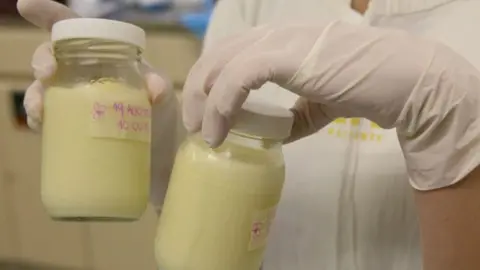Jacinda Ardern: Working mums on how to survive a short maternity leave
 Getty Images
Getty ImagesNew Zealand Prime Minister Jacinda Ardern has given birth to a baby girl, but plans to be back at her desk in six weeks' time.
The BBC spoke to other working mothers who took short periods of time off work and asked them what advice they would give others in the same situation.
'Do what you need to do to make it work'
Kelsey Gamble took six weeks of maternity leave for the birth of her first child.
In 2014, the then 23-year-old Australian moved to a different state and started a new job in marketing before she discovered she was pregnant.
With her partner halfway through his degree and not in any paid employment, she had to go back to work. Her employer at the time did not offer any paid maternity leave, and because she was so new to the job, she would not have been entitled to any government-paid leave.
Allow Instagram content?
"I went back to work shortly before my son was seven weeks old. I actually had to have an emergency surgery when he was six weeks old so I was not only recovering from childbirth, but that as well," says Ms Gamble.
Her partner stepped up as a full-time dad and "did a wonderful job at it".
However, Ms Gamble faced her fair share of challenges at work, including being told at one point to pump her breast milk in a disabled toilet and being unable to bring her baby in to work at the beginning.
"Do what you need to do to make it work," she says. "Never listen to the opinion of someone who isn't willing to buy your groceries, change a nappy or do your dishes for you."
'Make sure you have a good support system'
In 1997, Lu-lin Ong gave birth to her third child, and took almost four weeks off work.
The then 35-year-old was living in Singapore, back when government-paid maternity leave only extended to the first two children. She was unable to claim any maternity leave for her youngest child and instead had to use her own annual leave.
She scraped together less than a month's worth of leave. She says she couldn't have got back to work without the help of her family.
"I was toying with the idea of possibly giving up my job but my mum was willing to help out with the child," says the senior public servant. "It's very important to have the support."
 Getty Images
Getty ImagesThere were several sacrifices that had to be made, though, including giving up breastfeeding.
"I could only manage to breastfeed for two months. It was a tough decision because it wasn't very practical for me to keep pumping milk in the office, and there were no fridges in the office then either," she says.
"My advice is to make every moment you have with the child count. For working mums you make up for it in quality of time what you lack in quantity."
'Don't beat yourself up'
Jenny Blake took five weeks off for the birth of her fifth child in 1991.
There was no paid maternity leave in Australia then, so she was allowed two weeks sick leave and she claimed three weeks of annual leave.
"The economy was in recession in 1991 and we needed to pay our mortgage so I had to go back to work," she says. "I was in the media industry then and it was quite cut throat. If you left your job for too long someone would take it."
 Getty Images
Getty ImagesThe then 31-year-old remembers that she had nowhere to go during work to pump milk and in the end had to give up breastfeeding. She says she would sometimes cry on her way to work as her stomach was still feeling sore.
Ms Blake was able to hire a nanny but she feels like she missed out on all her child's major milestones, including him crawling and taking his first steps.
She wants Ms Ardern to know that she should "ignore the pressure from others".
"If women want to go to work we should support them. If they want to stay at home we should support them," she says. "There's always going to be the hard days. Don't beat yourself up when it happens. Do what you need to do to be a healthy happy mother."
Maternity leave around the world
New Zealand currently provides 18 weeks of paid maternity leave and under new laws that come into effect in July, that number will increase to 22 weeks.
But in countries including the US, Swaziland, Lesotho and Papua New Guinea, women are still unable to claim government-funded maternity leave.
The US is the only developed nation in the world that does not provide some type of national paid family leave to new parents.
Comparatively, parents in countries like Norway are entitled to 46 weeks of fully paid leave.
In the UK, mothers can take up to a year of maternity leave, though of that, only the first six weeks are almost fully paid at 90% of their earnings.
